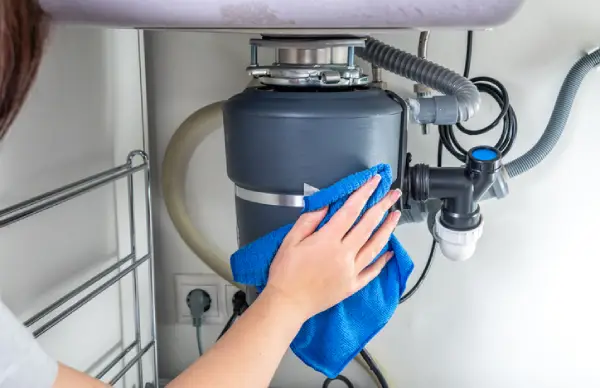If you have or have ever used garbage disposals, you know how much convenience they can bring. They quickly become one of the most used tools in the kitchen, and it’s easy to forget how much you use one until something goes wrong.
But when something falls into the disposal or you start noticing water leaking, now you’ll know what’s going on inside so that you can troubleshoot, repair, or replace it.
Main Parts of a Garbage Disposal
For the most part, garbage disposals in the Charleston area are canisters made from plastic or metal. There’s a motor at the bottom of the canister, connecting to an open grinding chamber (also known as a hopper) where food waste falls. Within the grinding chamber is a metal plate that spins, and there are two metal impellers that also spin, pressing food bits against a grinding ring until they are small enough to wash out of the chamber with the faucet water.
Underneath the disposal, you will find a motor reset button that is in place to prevent the motor from overheating. There will also be a nut built into the base of the disposal. This nut can be used with an Allen wrench to carefully loosen and move the impeller plate in case of a jam.
Top Reasons Garbage Disposal Leaks
Before rolling up your sleeves to begin an investigation, unplug the garbage disposal at the wall outlet and turn off the power to it. Then, place a stopper in the sink drain to seal out any water from the sink and wipe everything dry. Now you have a fresh slate to start troubleshooting.
Identifying the Garbage Disposal Leak Source

Mix some food colouring with a few cups of water, and pour the colourful water into the sink with the stopper. Then, you can take a flashlight and check for three main spots:
- The top portion where the disposal joins the sink drain
- The side connection to either the dishwasher hose or the main drain
- The bottom of the disposal
Using a cloth or rag (that’s not too dark in colour), check around the disposal for water to soak up. if you’re not finding anything, take the sink stopper out and add more colourful water down the drain before checking again.
Garbage Disposal Leaks from the Top: Torn Sink Flange Gasket
If you can see from under the sink that water is leaking from the top of the disposal, there’s a good chance it’s from a tear in the flange gasket. This is a simple gasket replacement so long as you’re careful to tighten the mounting flange very well once you’re done.
Plumber’s putty is also a replacement option if you don’t have a new gasket.
Garbage Disposal Leaks from the Side: Something is Loose
Dishwasher hose leak: This might be from a loosening metal clamp connecting the dishwasher hose to the disposal inlet.
Main drain leak: If the leak is on the side where the disposal connects to the waste drain, check the gasket in between the pipes to ensure it’s not worn out.
Garbage Disposal Leaks from the Bottom: Motor Seal Failure
Finding a leak coming from the housing likely means that the motor seal failed, and you’re due for a new garbage disposal, unfortunately. This is because one or more seals on the interior are no longer working, and the motor is not protected. Fortunately, if you’re semi-savvy at DIY plumbing, replacing a garbage disposal is doable. Of course, if you’re not, our team is here to help with local plumbing repairs and replacements in Charleston.
Tips for Making Your Garbage Disposal Last Longer
With proper care and correct installation, your new disposal should last anywhere from eight to 15 years.
Here are some of the easy things you can do to help your garbage disposal work great for as long as possible:
- Take time to clean out the garbage disposal to eliminate decay and odor
- Leave out any hard objects like cores, pits, or bones that can damage the interior
- Do not put oils, greases, or expandable foods down the disposal
- Only grind soft foods that aren’t going to stick to the disposal
- Before and after using the disposal, run cold water through it to help things flow smoothly
- Dye water to test for leaks any time you suspect an issue to stay ahead of major problems
Lastly, be sure to schedule routine maintenance checks from professionals to ensure you’re doing everything you can to prevent future issues. At Mr. Rooter Plumbing of Greater Charleston, we’re here for your garbage disposal repair and maintenance needs!

